U.S. Stopped Syria Air Strikes While Nusra And IS
Prepared Attack On Government Supply Route
By Moon Of Alabama
October 30, 2015 "Information
Clearing House" - "Moon
Of Alabama" - - During the
last days a large attack on the Syrian government supply line to
Aleppo city was carried out by Jabhat al-Nusra (aka al-Qaeda in
Syria) and the Islamic State seemingly in coordination with the U.S.
military.
During September the U.S. anti-IS coalition
carried out an average of 4.2 airstrikes on IS in predominately east
Syria. This after an average of 6.8 per day in August. The rate in
October was about the same as in September until Thursday October
22. Then, according to the U.S. Military Times, the strike rate
decreased
markedly:
~4 strikes per day up to Oct 20
4 - Oct 20 Tuesday
8 - Oct 21 Wednesday
1 - Oct 22 Thursday
0 - Oct 23 Friday
0 - Oct 24 Saturday
0 - Oct 26 Sunday
1 - Oct 27 Monday
0 - Oct 28 Tuesday
0 - Oct 29 Wednesday
The Islamic State used the lull in airstrikes in
east Syria to move hundreds of fighters and heavy equipment towards
the supply line that connects Damascus with the government held
areas (green) of Aleppo.

After two days of no U.S. airstrikes in east Syria
the Islamic State (purple) attacked the government supply corridor
from the east while at the same time and at the same main point
Jabhat al-Nusra (orange) attacked the supply corridor from the west.
The attacks started with suicide car bombs against Syrian army
checkpoints which suddenly had to defend themselves to the front and
the rear.
On Saturday October 24 Almasdar news
reported:
For the first time in three months, the Syrian
Arab Army’s (SAA) main supply route along the Khanasser Highway
was closed due to an obstruction by the Islamic State of Iraq
and Al-Sham (ISIS); this chaotic situation forced the
pro-government forces to call on hundreds of reinforcements from
the Aleppo Governorate to help push back the encroaching
terrorists.
Initially, the Syrian Armed Forces were
successful in repelling both ISIS and the Syrian
Al-Qaeda group “Jabhat Al-Nusra” after they attacked from
different axes in the Hama Governorate; however, ISIS
regrouped near the Al-Raqqa Governorate border in order to
launch another massive assault on the Khanasser Highway.
ISIS’ second assault on the Syrian Armed
Forces’ defensive positions proved successful, as they cutoff
the Khanasser Highway and pushed further west towards the
strategic city of Ithriyah in east Hama.
The Islamic State fighters killed about a dozen
government troops and captured several armed vehicles (gruesome
photos here).
The Syrian army send reinforcements from the
Palestinian resistance militia Liwaa Al-Quds to help clear the road.
This was only somewhat successful as bad weather and a
sandstrom on the 25th prevented air support.
The operations room in Damascus was not too
unhappy with the situation even though the road was still cut. The
thought was that having IS and Nusra fighters concentrated in an
otherwise wide open rural area would help to eliminate them. On the
26th and 27the Russian and Syrian air forces
flew
some 90 attacks within 24 hours against the enemy held parts of the
road.
These attacks cleared the IS held parts of the
road but the Islamic State concentrated more forces on another part
of the road further north and on October 27 it
suicide-bombed another government checkpoint and again blocked
the road. Additional support from Hizbullah arrived during the next
days and the road is now mostly cleared though
still endangered.
The closed supply route
led to hardship for the nearly two million people in the
government held parts of Aleppo as prices for produce and gasoline
exploded.
The operations room in Damascus where Syria, Iran,
Russia and Hizbullah coordinate the intelligence and operations in
Syria
suspects that the attack on the supply corridor was coordinated
at a higher level than just between Nusra and the Islamic State.
The total cessation of U.S. air attacks on east
Syria allowed the Islamic State to move hundreds of fighters and
heavy equipment like tanks and cannons from its stronghold in Raqqa
city to the west of Syria. At the same time Jabhat al-Nusra brought
hundreds of fighters from other fronts south-eastward for its part
of the attack. It is difficult to believe that these were just
unrelated coincidences.